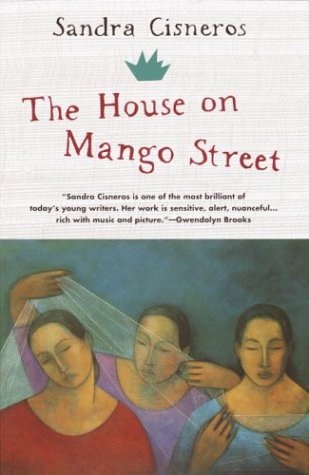
Cisneros, Sandra. The House on Mango Street. Vintage Contemporaries: 1984. ISBN: 0679734775.
Overview:
Esperanza is caught between two worlds: childhood and adolescence, Hispanic and American. She wants things to be different, the house, her family, the way girls are treated. We get small glimpses into Esperanza's life and realize she is not unhappy, but confused and trying to make sense of growing and fitting in amongst a different culture. An interesting vignette about shoes illustrates the point. The girls find a couple pairs of high heeled shoes and have fun strutting around. They go down the street to the store and notice men treating them differently. One scolds them for wearing such shoes and another wants a kiss. The girls go home and hide the shoes not minding when the mother throws them out. Many times we think we are old enough for something and then we realize being young is not so bad after all. Meaning can be represented in the smallest things. Esperanza wants to exert her own power and not give it away, "I have begun my own quiet war. Simple. Sure. I am the one who leaves the table like a man, without putting back the chair or picking up the plate"(pg. 89).
Critical Evaluation:
Told in small vignettes, Esperanza's story is full of longing and hoping. This book is an important read for high school students because it deals with problems like prejudice and the treatment of women. It also shows that growing up has it's hills and valleys. Multicultural books are important for American students to understand what life is like for teens of another skin color. Many of the things we take for granted are confusing to immigrants. It is useful for students of all nationalities to see their experience reflected in literature. At the same time, much of Esperanza's journey is similar to any teen, the desire for autonomy, exerting your own power, to be confident in who you are. Sandra Cisneros taps into what it means to be human and specifically female. We are all sisters with shared experiences and we should look out for one another.
Reader's Annotation:
We all have obstacles and victories. How you handle it and who you become is up to you.
Information About the Author:
Born in Chicago in 1954, Sandra Cisneros was the only daughter among seven children. Graduating from Loyola University in 1976 with a degree in English and in 1978 with a M.F.A. in Creative Writing from the University of Iowa. Sandra has worked as a educator and college recruiter. Her poetry and fiction has won international attention; Bad Boys, My Wicked Wicked Ways and Caramelo are a few titles. Still busy writing, Sandra lives in San Antonio Texas and is working on a children's book.
Genre:
Multicultural Fiction/Hispanic Americans
Curriculum Ties:
Immigrants
Hispanic Americans
Culture of Families
Booktalking Ideas:
Discuss the way different cultures view women.
How do you treat people who look or talk different than you do?
Reading Level/Interest Age:
9th +
Challenge Issues:
None
Why Include This Book?
I enjoy coming of age stories. It is important for teens to have access to stories about people who have experiences that are different than there own. It is also important for any teen of any background to be able to find themselves in literature.
No comments:
Post a Comment